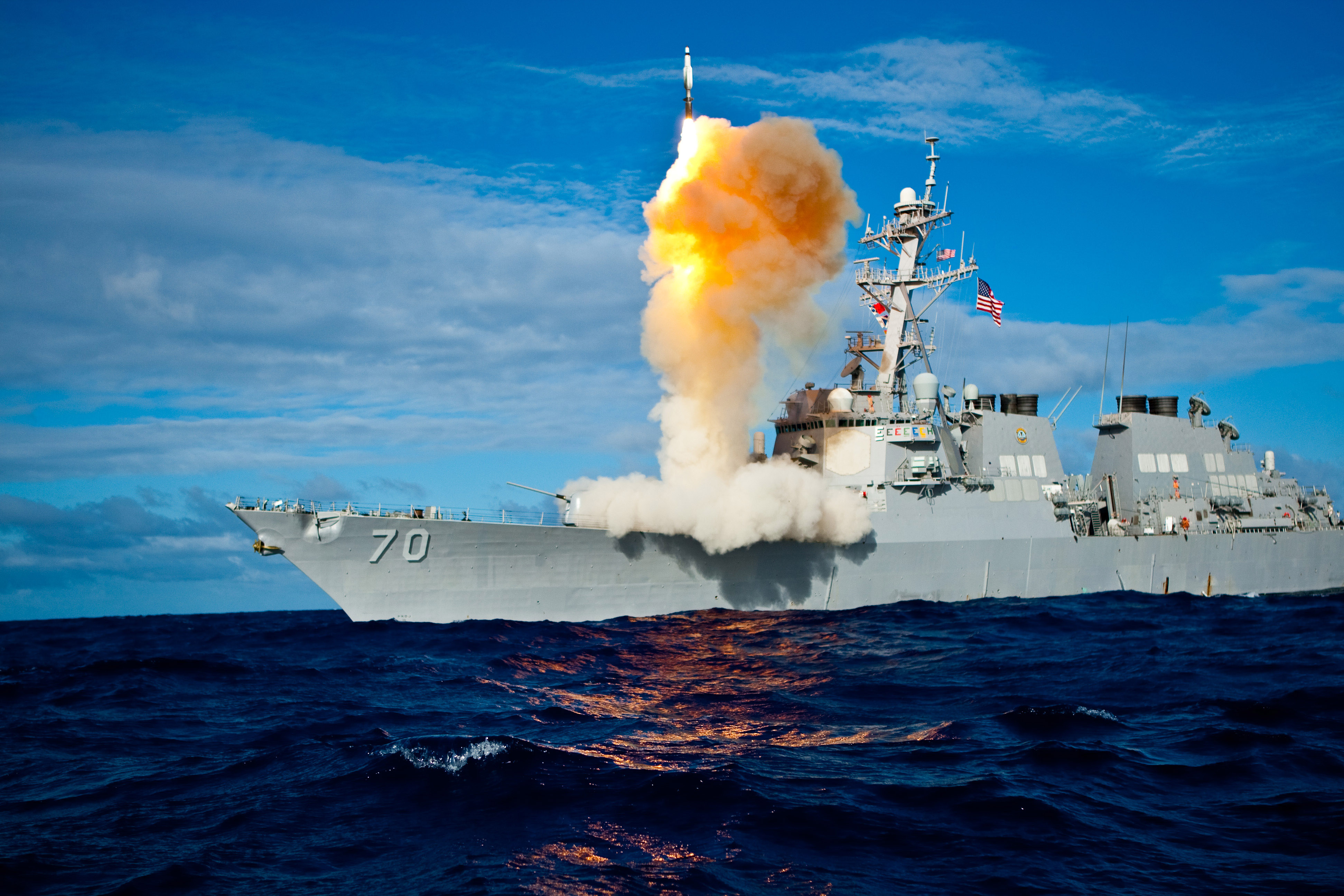[captionpix align=”left” theme=”elegant” width=”320″ imgsrc=” http://mypetjawa.mu.nu/archives/uss%20cole%202000.jpg ” captiontext=” The USS Cole patrols the Mediterranean as part of the NATO effort to develop a ballistic missile defence shield in Europe.”]
On May 20th, at its Chicago Summit, NATO announced that the US led, NATO-backed ballistic missile defence (BMD) system in Europe would become fully operational by 2018. US Ambassador to NATO, Ivo Daalder, explained that the system “will provide real protection for parts of NATO Europe against ballistic missile attack.” Currently, the anti-ballistic missile defence system operates in an “interim capability;” American Naval vessels deployed in the Mediterranean use their Aegis anti-missile systems jointly with a new high-powered X-Band radar in Turkey to defend against long-range ballistic missile attacks. Both Germany and the Netherlands will contribute Patriot Missiles from their current air-defence systems to reinforce the overall framework. In the future, the anti-missile system will see a higher presence of Alliance warships, as well as the development of land-based missile sites in Romania and Poland.
Potential Victims
Despite the congratulatory announcement, the US-NATO plan has many critics. At the forefront of the criticism are the questions of whether the extremely expensive (projected at $12-15 billion per year or approximately 2% of US defence budget) missile defence shield will be effective enough to warrant the high price tag and potential political fallout. Others question if the allied countries are currently under the threat of a missile attack, and if not, whether the vast network of anti-ballistic missile defence systems will unnecessarily strain relations between Russia and the West and potentially create a strategically unstable climate. While the advancement of ballistic missile technology is to be taken seriously, the actual threat from nations capable of delivering any meaningful payload is very small. Aside from Russia, the only potential ballistic missile threat to NATO countries is Iran. Missile defence technology expert Professor Theodore Postol of the Massachusetts Institute of Technology believes that there is very little reason to see any threat in Iran, explaining, “the fundamental long-term threat from Iran is from nuclear weapons. But for now Iran does not have the bomb.” Furthermore, Iran currently poses very little threat to any strategically important Alliance targets with its current ballistic missile arsenal. Without any large conventional munitions, Iran’s current missiles lack sufficient firepower to cause considerable damage. Professor Postol also questioned the Iranian Sajjil missile’s accuracy, claiming that they would be unable to “hit the prescribed targets with reliability.”
Coverage Policy
Leaders and analysts believe that given the committed progression Iran has made to develop its nuclear program – regardless of whether or not it plans on developing weapons-grade uranium – the missile defence system provides judicious coverage for what could potentially turn into a true threat. Professor Sean Kay, Chair of International Studies at the Ohio Wesleyan University, expressed confidence in the American approach to establishing missile defence systems in Europe, claiming that the gradual implementation represents the “core collective defence foundation” of what NATO stands for.
Offence vs. Defence
Russia, however, sees things differently.
The focus on offence-defence relations comes to a head as military leaders in Moscow have boldly threatened to deploy their warhead capable Iskander missiles should the anti-missile sites in Poland and Romania continue to develop. Additionally, four days after the Chicago summit, Russia’s military reported a successful test launch of a new model of intercontinental ballistic missile specifically designed to outmatch the US-backed missile defence system. For some, the extensive defensive measure of BMD directly impacts the deterrent capacity of Russia’s nuclear arsenal. Ernie Regehr, O.C. Research Fellow at the Institute of Peace and Conflict Studies at Waterloo, expressed his concerns regarding American plans for BMD, claiming, “BMD would scuttle, rather than promote, arms control, creating enormous incentives to increase efforts to acquire weapons of mass destruction and the missiles to deliver them.” Retired rocket forces Commander, Gen. Viktor Yesin explained that the development of the rocket represents the arms race that Russia is primed to embark on should NATO follow through with its projected plans. Dmitri Trenin, Director of the Carnegie Center in Moscow further explains that “Moscow wants both formal assurances and an insight into the system’s parameters, to be confident that the US has no intention of degrading Russia’s own deterrent power, and that the NATO system has no capability against Russian strategic missiles. Washington’s reluctance to give either raises Moscow’s suspicions.” Objectively, Russia’s vehement opposition has complicated and will continue to complicate NATO’s future decisions regarding the deployment of the anti-missile systems. If no agreement can be reached between the US-NATO effort and Russia, it is likely that the strategic environment in Europe will be far less stable after the BMD system becomes fully operational than it was before.
Is This How We Do It…?
[captionpix align=”left” theme=”elegant” width=”320″ imgsrc=” http://www.mda.mil/global/images/system/thaad/ftt14_7721.jpg ” captiontext=” A successful test by the US Missile Defence Agency”]
The Western Alliance has expressed great confidence in the capability of the BMD system. The US Missile Defence Agency noted that “highly successful” test launches of the improved SM-3 missiles had been conducted. However, the test launches were performed under extremely controlled circumstances, with heavily regulated environments, and without any objects that might confuse the missiles. Professor Postol states, “It is overwhelmingly likely that if the SM-3 is used in real combat, it will be total failure.”
Despite the “successful” tests, there are various factors limiting the possibility of the BMD system from becoming truly effective. Herein lies the fundamental issue, becoming “truly effective” would require as close to 100% accuracy as possible; but the technological limitations of BMD interceptors mean that BMD will never be 100% effective. Given the high probability of technological failure, the countermeasures and decoys available to confuse the system, and the rationale for potential adversaries to develop further offensive measures, BMD appears to be an extremely expensive yet unproven form of security. Conversely, if a true ballistic missile threat presented itself in the absence of NATO’s current missile defence initiatives, the time required to develop a capable anti-missile system would put the West at a significant strategic disadvantage. These factors beg the questions: how close to perfect is useful? How much treasure are NATO allies willing to exhaust for relative success? In an age where nuclear arms and biological weapons are a constant in the discussion of international security, some believe that if 99 of 100 missiles are blocked, one is still far too high a margin for error to call the system credible. However, if you are unable to stop all 100, should you also let 99 go?




